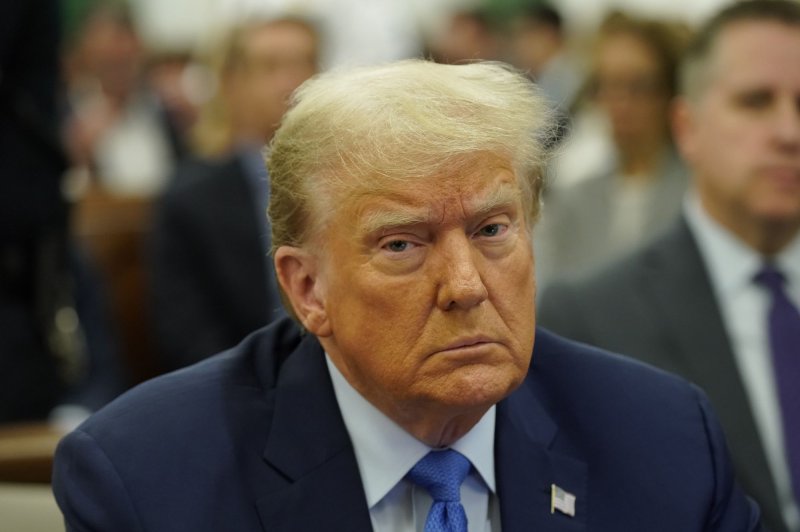Former President Donald Trump appears in a New York courtroom for his civil fraud trial on November 6. Pool Photo by Eduardo Munoz/UPI |
License Photo
Nov. 15 (UPI) -- Donald J. Trump is trapped in a maze of criminal and civil trials. With a total of 91 indictments against him, Trump is in extreme legal and political jeopardy that could land him in prison.
If he runs for president, these cases could cost him the 2024 election. Of course, Americans are innocent until proven guilty. And juries are unpredictable.
But will he avoid convictions?
Trump lost a civil suit in May filed by E. Jean Carroll costing him $5 million. Carroll has him back in court on Jan. 15, the day of the Iowa Caucuses. The Trump Organization was found guilty in December of tax fraud, grand larceny and falsifying records.
But the two federal and two state trials must worry Trump and his lawyers most. In Georgia, Trump was indicted for racketeering and violating the RICO statute (Racketeer Influenced and Corrupt Organization Practices Act) by attempting to overthrow the 2020 Georgia elections. Three of his attorneys have obtained plea agreements. Reportedly, more are forthcoming. This can only be damning for Trump.
On March 4, the day before Super Tuesday, Trump faces federal charges of attempting to overthrow the 2020 presidential election by creating a false slate of electors. The state trial, scheduled for March 25, is about falsifying records in paying $130,000 to adult film actress Stormy Daniels as "hush money." And what seems to be the most likely case leading to conviction is illegal possession and handling of classified documents and obstruction of justice. No trial date has been set yet.
In this last case, evidence of guilt came from the president's own mouth. He volunteered that he did possess classified material; asserted he still had declassification authority, even though he did not; and wrongly argued that he had authority from the Presidential Records Act to keep classified material.
Trump has been a Teflon Don in avoiding criminal and most civil prosecutions since his earliest days in business with his father. His current defenses range from pleading immunity to delay. He has tried to intimidate judges and potential jurors. In the New York fraud trial, Judge Arthur Engoron fined Trump $15,000 for violating gag orders.
If Trump is re-elected president, he could self-pardon any federal convictions. Georgia is more problematic. For anyone convicted and sentenced to jail, Georgia statutes require serving a minimum of five years before pardon or commutation can be granted. The governor has no power to pardon. Because it is state law, neither does the president.
The New Yorker of Trump's generation who combined celebrity status with an avalanche of trials was another Don -- the Teflon Don and crime boss John Gotti. Some readers will find the comparisons offensive. But the similarities are striking. If convicted of attempting to subvert an election, as well as failing to safeguard the nation's secrets, are these charges any less serious than those leveled against Gotti?
Former FBI Director James Comey wrote in his autobiography that Trump operated in ways reminiscent of the mob. Loyalty was paramount. And Trump often operated according to his own rules, often of doubtful legality.
Trump has been Teflon-like in winning. And he is as flamboyant in disregarding court instructions. Like Gotti, if convicted in the classified material trial, Trump will have admitted his own guilt.
Gotti became notorious after Gambino crime boss Paul Castellano was gunned down outside the New York steakhouse Sparks before Christmas in 1985. Gotti ordered the hit and became New York's leading crime boss.
Arrested numerous times and convicted of manslaughter in 1980, Gotti gained an early release. Then followed numerous trials that were media spectacles in which the Teflon Don wore $2,000 suits. Unlike other criminals, he craved media attention. Gotti eluded conviction, despite overwhelming evidence against him. And he was no less a New York celebrity than Trump.
The reasons for acquittal were jury tampering, intimidation and outright bribery. These added to his image, making him a hero to some New Yorkers, despite the brutality of his crimes. Arrested in 1990 on charges of murder and other serious offenses, he was convicted and sentenced to life in prison without parole. He died in 2002.
Key evidence that convicted Gotti came from wire taps in the apartment above the Ravenite Club, his de facto headquarters. Gotti freely admitted to all his crimes in almost casual conversations. That he failed to anticipate bugs and wire tapes that led to his downfall is an interesting question. And Trump did not need wiretaps.
The next year will determine whether Trump is a Teflon or a Velcro Don.
Harlan Ullman is UPI's Arnaud de Borchgrave Distinguished Columnist, a senior adviser at Washington's Atlantic Council, the prime author of "shock and awe" and author of "The Fifth Horseman and the New MAD: How Massive Attacks of Disruption Became the Looming Existential Danger to a Divided Nation and the World at Large." Follow him @harlankullman. The views and opinions expressed in this commentary are solely those of the author.















